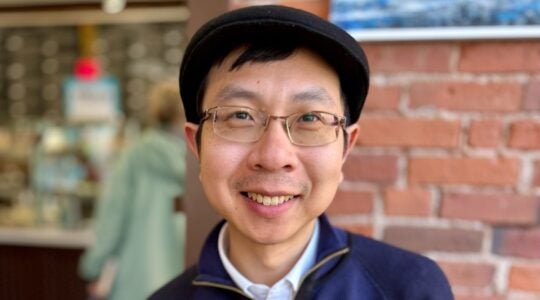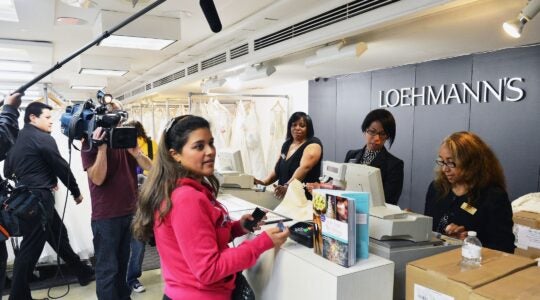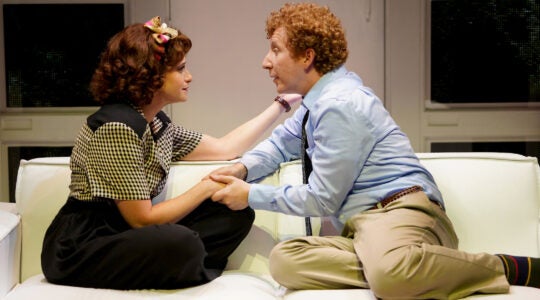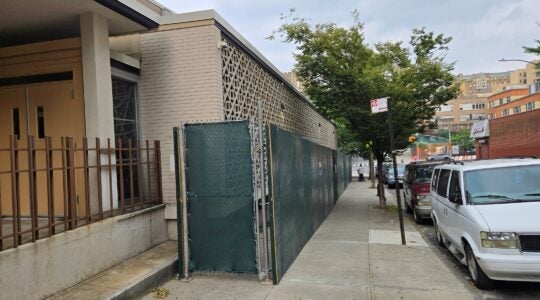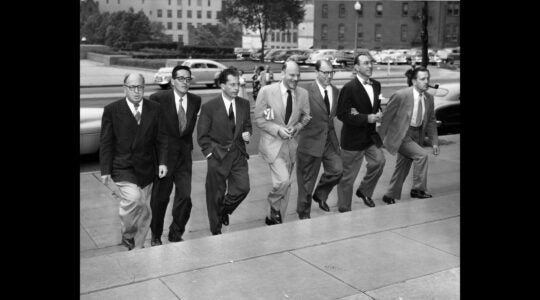As long as I can remember, I was aware of a mythical place in Manhattan known as The Seminary.
The Seminary was central to my parents’ life; it was the place where my father studied to be a rabbi and my mother made friends with the fiancés and wives of rabbinical students who, like her, were well-educated girls from good Jewish homes.
From my mother’s description, I knew that The Seminary was grand, a magnificent work of neo-Colonial architecture, proudly claiming a corner of a city block, constructed like a fortress, a testament to the secure status of Jews in America, or at least, in New York City.
From my father, I knew that The Seminary was filled with brilliant professors and important leaders whose names would appear in The New York Times. The head of The Seminary was called “chancellor” — a thrilling, mellifluous word. For most of my childhood, I heard about Louis Finkelstein, the legendary chancellor who looked to me like Moses or Monet. Dr. Finkelstein seemed to be on par with the President of the United States and the respect with which my father invoked his name informed me that I was probably right.
I would feel a special thrill when I heard that my father was driving into the city for a meeting or program at The Seminary. This meant that my father was a member of a social, intellectual and religious A List; that his importance extended beyond our synagogue community in Douglaston, Queens, where he served as rabbi. When my parents returned from an evening “function” at The Seminary, I would wait up to inhale the rarified air they exuded.
Yet, while The Seminary occupied a central place within the landscape of my childhood world, I only visited it for the first time as a teen. Approaching the iconic institution, I was fascinated to find that its façade was directly across from a gritty urban site: the exact spot where the No. 1 subway line triumphantly emerges from its underground tunnel on its uptown journey and the downtown train dives deep down into the bowels of Manhattan.
Stepping through the imposing front gate on the corner of Broadway and West 122nd Street for the first time, I felt a sense of homecoming. Standing in the courtyard, circling slowly to absorb the 360-degree view, I felt that I had both X-Ray vision and telepathy, for I could surely see through the stone walls and know the location of every room within the interlocking buildings.
Meeting The Seminary on my own terms, on the cusp of adulthood, was like visiting my grandparents’ house – familiar yet deliciously mysterious. Or perhaps my first encounter was more akin to meeting my soul mate. The Seminary was not just the institution that had ordained my father. The Seminary had been waiting for me.
It was love at first sight. Within the blink of an eye, I was attending “functions” as my parents had, just a decade or so earlier; soon I was spending time on campus interviewing students, professors, administrators and even the chancellor — now Dr. Gerson Cohen — for articles I was writing on the struggle for women’s ordination within the Conservative movement. (That right was won in 1983).
Invited by Burt Visotzky to join the Genesis Seminar in1987, I found myself lucky to encounter a new face of The Seminary — the nighttime building, dramatic as a castle — the courtyard pristine beneath a velvety sky. I loved the way the exterior darkness created a cozy atmosphere inside the cafeteria room where the well-known scholars and writers gathered to discuss and debate the Bible as a work of literature and I was mostly silent, awed to be part of this fellowship.
My husband, two children and I were living in Westchester County at the time and I commuted by car from our home to attend the Genesis Seminar, serving as a chauffeur to two older female writers, both world-renowned. Yet within a matter of years, I had moved back to Manhattan, indeed, only six blocks south of The Seminary. This enabled me to commute by foot on a daily basis because I now had a legitimate stake in The Seminary as its newly hired media specialist.
For three years, I walked happily from our apartment on West 116th Street and Amsterdam to my office at The Seminary. The proximity to my home meant that my older children, Adam and Emma, would frequently come to The Seminary after school instead of going home. Sitting in the courtyard, cafeteria or on my office floor, they would do their homework and negotiate for snacks.
Soon, I was accompanied on my commute by a new baby, for my youngest son, Judah, was born a year after I began my job. Before I gave birth, my department head suggested I bring my new child to work with me (as a way of encouraging me to return after a three-month maternity leave) and I took her up on the offer, hiring a nanny to watch my newborn son while I worked. We set up a cozy nursery in the childcare room outside of the Women’s League Seminary Synagogue and I became one of the luckiest working mommies in town, able to nurse my baby, see him during the day and also hold down a demanding full-time job. During the year that he attended The Seminary’s “Day Care Center” Judah became a mascot of sorts, fussed over by no less than Chancellor Ismar Schorsch, who would smile broadly and pat him on his head whenever we passed each other in the hallway.
I would gladly have kept my job at The Seminary forever but my husband’s Fulbright Fellowship earned us a sabbatical in Israel and we left New York in the spring of 1997. Our farewell celebration took the form of a Sunday bar mitzvah at The Seminary for our son Adam, in which he performed original compositions inspired by his Torah reading on the grand piano in Feinberg Auditorium, followed by a spirited party in Alperin Lobby (Adam’s friends got their own party space in Mendelson Convocation Center). As our guests and family members filtered out to the courtyard to enjoy the abundant sunshine spilling on the lush lawn, The Seminary’s fortress-like walls surrounded our simcha like a womb made of majestic stone.
Yes, I had left but of course, I was destined to come back. Once our sabbatical ended and we were back in New York, there was always a reason to be at The Seminary — a film, a lecture, a dinner, a book party, a celebration, a function of one sort or another. Like friends who cannot be separated, The Seminary and I kept finding our way back to one other.
When I began my public relations consultancy in 2002, the Rabbinical Assembly (located at The Seminary) was an early client. For eight years, I repeated the six-block journey — now only a few times a month — relishing my conversations with Rabbi Joel Meyers, then executive vice president, and my good friend Rabbi Jan Kaufman, who is the keeper of the soul of the Rabbinical Assembly.
In recounting my relationship with this building, which is really a maze of buildings and a whole world unto itself, I am still leaving so much out. It was The Seminary’s library that I visited in 1984 following the premature birth of my oldest son to research Hebrew names, hauling out an oversized concordance in those pre-Internet days. It was The Seminary’s courtyard where I sat with my good friend Jonathan Mark and a nervous, young, married Satmar man, posing as a prospective concubine for an article I was researching. It was in Feinberg Auditorium that I shed tears at the funeral of Rabbi Wolfe Kelman, who preceded Rabbi Meyers at the Rabbinical Assembly and was a great friend to my family.
It was in the dingy back of The Seminary’s library building where I diligently showed up each Sunday morning for a year as an instructor for the Ivry Prozdor High School. It was in The Seminary’s glorious, green, grand sukkot that I celebrated the harvest festival with my family for years. And speaking of glorious, it was in Feinberg Auditorium that I sat with Judah, now a teen himself, at a screening of Quentin Tarantino’s “Inglourious Basterds.”
It was in the office of the Rabbinical School where I sat with Burt Visotzky (then its dean) — nearly two decades ago — having a half-hearted conversation about applying to the program because my husband had a sudden inspiration that I would make a great Conservative rabbi.
Burt looked at me skeptically — or perhaps it was incredulously — while I enumerated all the reasons I wanted to go to rabbinical school until I broke down, confessing that I was not interested in being a rabbi and the real reason I had come was because my husband said he would only go for his colonoscopy if I took his suggestion seriously.
Looking back, I realize that my husband had not been completely wrong though the deal he struck with me was batty. Unpleasant medical tests should never be contingent upon your spouse considering a particular profession. Though I was not destined to be a rabbi, my husband somehow knew that I belonged at The Seminary. ◆
Shira Dicker is a writer and consultant living in Manhattan. She is the author of the blog, Bungalow Babe in the Big City.
The New York Jewish Week brings you the stories behind the headlines, keeping you connected to Jewish life in New York. Help sustain the reporting you trust by donating today.
